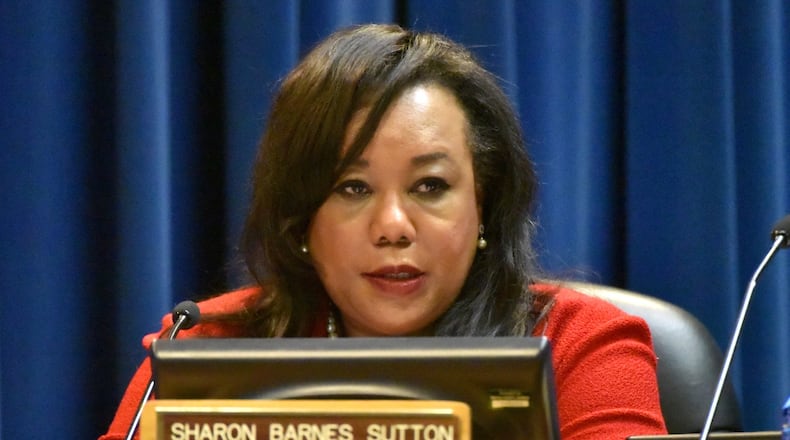An attorney for ex-DeKalb County Commissioner Sharon Barnes Sutton inadvertently made public the name of a “confidential human source” the government hopes to use in the case against the indicted former official.
The exact connection, though, was unclear.
Barnes Sutton is scheduled to stand trial later this month on federal bribery and extortion charges that date back to 2019. Prosecutors allege the actions — in which she solicited a total of $1,000 from a contractor seeking work on the county’s Snapfinger Creek Advanced Wastewater Treatment Plant — took place in 2014, some five years before her arrest.
The former commissioner’s trial has been delayed multiple times due to COVID-19 and a litany of other issues. A Tuesday morning hearing in front of U.S. District Court Judge Mark H. Cohen was meant to address any outstanding issues ahead of proceedings finally beginning on Oct. 25.
It did that. And perhaps a bit more.
Near the end of the hearing, Barnes Sutton’s public defender, Mildred Dunn, was arguing against the prosecution’s still pending motion to introduce “previous bad acts” as evidence in the case.
What exactly those alleged acts were was not made clear in court. But Dunn mentioned the name Arnie Silverman at least twice before Judge Cohen asked for clarification on who he is.
Dunn, who had moments before referenced a $4,000 campaign contribution Barnes Sutton reportedly received from Silverman in 2012, answered by describing him as a “confidential human source” that investigators “got to wear a wire.”
Prosecutors and the judge quickly balked, pointing out that any documents using Silverman’s name had been filed under seal — and that a reporter was in the courtroom.
Cohen immediately stopped discussion and ordered Dunn to file a written response to the motion (which would be sealed). Dunn apologized.
Arnie Silverman, 74, is the founder of Silverman Construction Project Management, a nearly 30-year-old firm with a prolific portfolio in DeKalb County and the city of Atlanta. According to his website, Silverman has previously served as chair of the DeKalb Chamber of Commerce and Leadership DeKalb and as a member of the MARTA Board of Directors.
On Wednesday, an attorney representing Silverman issued a statement saying he has “a sterling reputation in the metro Atlanta community.”
“It is unfortunate that Mr. Silverman’s name was identified in open court by the defendant’s attorney, since he was a confidential source for the FBI and his name should have remained under seal,” Amanda Wellen, an associate at Atlanta law firm Alston & Bird, wrote.
“Mr. Silverman was asked by the government to assist in conducting investigations into public corruption, and he did so as a good citizen who abhors corruption. Mr. Silverman did not receive any kind of benefits from the government, nor was he the subject of any investigation.”
It was unclear if Silverman’s work on behalf of federal investigators was directly tied to the current charges against Barnes Sutton or if it was related to an earlier attempt to catch the commissioner acting illegally.
But the context of the conversation in court suggested the latter, as do the currently known facts surrounding the allegations against Barnes Sutton.
Prosecutors’ case against the former commissioner rests in part on a series of conversations surreptitiously recorded by a county official who was unnamed in the indictment but later identified as Morris Williams.
Williams previously served as the chief of staff for DeKalb’s Board of Commissioners and as a deputy chief operating officer. Dunn referred to him as the prosecution’s “snitch” during Wednesday’s hearing.
Williams recorded himself and Barnes Sutton discussing and coordinating the alleged bribe payments from Contractor A. He also recorded post-payment conversations with the unnamed contractor.
Transcripts of those calls and other court documents suggest Reginald Veasley — the leader of a subcontractor for larger firm Tetra Tech on the treatment plant project — was the contractor.
About the Author
Keep Reading
The Latest
Featured

